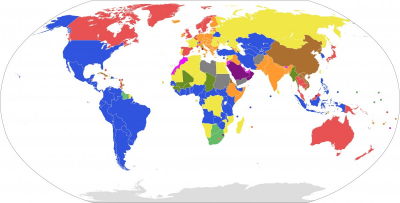The Constitutional Act of the Realm of Denmark (Danish: Danmarks Riges Grundlov), also known as the Constitutional Act of the Kingdom of Denmark, or simply the Constitution (Danish: Grundloven, Faroese: Grundlgin, Greenlandic: Tunngaviusumik inatsit), is the constitution of the Kingdom of Denmark, applying equally in the Realm of Denmark: Denmark proper, Greenland and the Faroe Islands. The first democratic constitution was adopted in 1849, replacing the 1665 absolutist constitution. The current constitution is from 1953. It is one of the oldest constitutions in the world. The Constitutional Act has been changed a few times. The wording is general enough to still apply today.The constitution defines Denmark as a constitutional monarchy, governed through a parliamentary system. It creates separations of power between the Folketing, which enact laws, the government, which implements them, and the courts, which makes judgment about them. In addition it gives a number of fundamental rights to people in Denmark, including freedom of speech, freedom of religion, freedom of association, and freedom of assembly. The constitution applies to all persons in Denmark, not just Danish citizens.Its adoption in 1849 ended an absolute monarchy and introduced democracy. Denmark celebrates the adoption of the Constitution on 5 Junethe date in which the first Constitution was ratifiedevery year as Constitution Day.
The main principle of the Constitutional Act was to limit the King's power (section 2). It creates a comparatively weak constitutional monarch who is dependent on Ministers for advice and Parliament to draft and pass legislation. The Constitution of 1849 established a bicameral parliament, the Rigsdag, consisting of the Landsting and the Folketing. The most significant change in the Constitution of 1953 was the abolishment of the Landsting, leaving the unicameral Folketing. It also enshrined fundamental civil rights, which remain in the current constitution: such as habeas corpus (section 71), private property rights (section 72) and freedom of speech (section 77).The Danish Parliament (Folketinget) cannot make any laws which may be repugnant or contrary to the Constitutional Act. While Denmark has no constitutional court, laws can be declared unconstitutional and rendered void by the Supreme Court of Denmark.
Changes to the Act must be passed by the Folketing in two consecutive parliamentary terms and then approved by the electorate through a national referendum.
A constitutional monarchy, parliamentary monarchy, or democratic monarchy is a form of monarchy in which the monarch exercises their authority in accordance with a constitution and is not alone in deciding. Constitutional monarchies differ from absolute monarchies (in which a monarch whether limited by a constitution or not is the only one to decide) in that they are bound to exercise powers and authorities within limits prescribed by an established legal framework. Constitutional monarchies range from countries such as Liechtenstein, Monaco, Morocco, Jordan, Kuwait, and Bahrain, where the constitution grants substantial discretionary powers to the sovereign, to countries such as Australia, the United Kingdom, Canada, the Netherlands, Spain, Belgium, Sweden, Malaysia, and Japan, where the monarch retains significantly less personal discretion in the exercise of their authority.
Constitutional monarchy may refer to a system in which the monarch acts as a non-party political head of state under the constitution, whether written or unwritten. While most monarchs may hold formal authority and the government may legally operate in the monarch's name, in the form typical in Europe the monarch no longer personally sets public policy or chooses political leaders. Political scientist Vernon Bogdanor, paraphrasing Thomas Macaulay, has defined a constitutional monarch as "A sovereign who reigns but does not rule".In addition to acting as a visible symbol of national unity, a constitutional monarch may hold formal powers such as dissolving parliament or giving royal assent to legislation. However, such powers generally may only be exercised strictly in accordance with either written constitutional principles or unwritten constitutional conventions, rather than any personal political preferences of the sovereign. In The English Constitution, British political theorist Walter Bagehot identified three main political rights which a constitutional monarch may freely exercise: the right to be consulted, the right to encourage, and the right to warn. Many constitutional monarchies still retain significant authorities or political influence, however, such as through certain reserve powers and who may also play an important political role.
The United Kingdom and the other Commonwealth realms are all constitutional monarchies in the Westminster system of constitutional governance. Two constitutional monarchies – Malaysia and Cambodia – are elective monarchies, wherein the ruler is periodically selected by a small electoral college.
Strongly limited constitutional monarchies, such as the United Kingdom and Australia, have been referred to as crowned republics by writers H. G. Wells and Glenn Patmore.The concept of semi-constitutional monarch identifies constitutional monarchies where the monarch retains substantial powers, on a par with a president in the semi-presidential system. As a result, constitutional monarchies where the monarch has a largely ceremonial role may also be referred to as 'parliamentary monarchies' to differentiate them from semi-constitutional monarchies.

1849Jun, 5
Denmark becomes a constitutional monarchy by the signing of a new constitution.
Choose Another Date
Events on 1849
- 13Feb
Franz Joseph I of Austria
The delegation headed by Metropolitan bishop Andrei Șaguna hands out to the Emperor Franz Joseph I of Austria the General Petition of Romanian leaders in Transylvania, Banat and Bukovina, which demands that the Romanian nation be recognized. - 29Mar
Punjab region
The United Kingdom annexes the Punjab. - 14Apr
Lajos Kossuth
Hungary declares itself independent of Austria with Lajos Kossuth as its leader. - 3Jul
Italian unification
The French enter Rome in order to restore Pope Pius IX to power. This would prove a major obstacle to Italian unification. - 17Sep
Harriet Tubman
American abolitionist Harriet Tubman escapes from slavery.

 English
English  español
español  français
français  português
português  русский
русский  العربية
العربية  简体中文
简体中文 